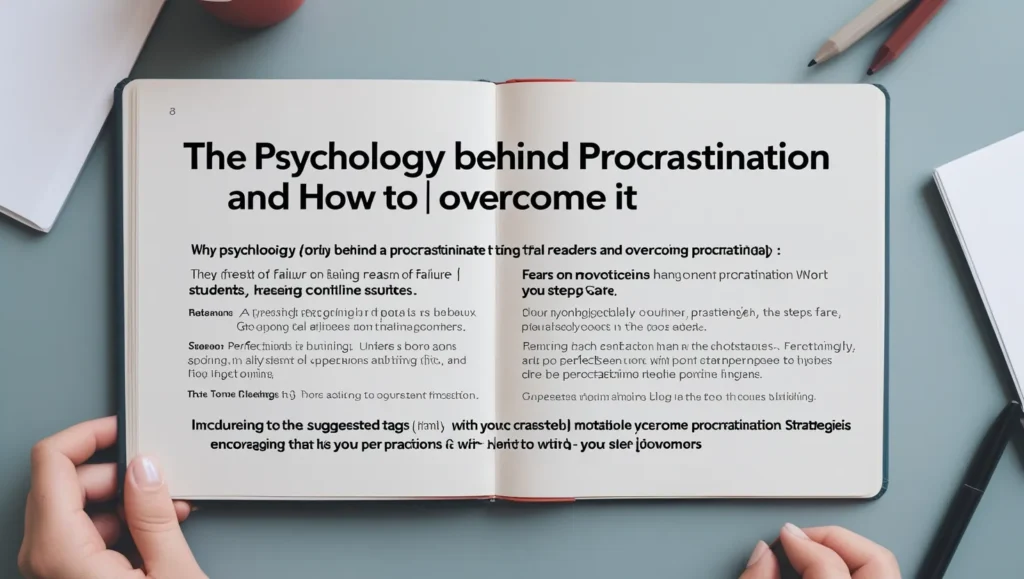The Psychology Behind Procrastination
We’ve all been there—putting off a task until the last minute, convincing ourselves that we work best under pressure, or simply choosing Netflix over finishing a report. Procrastination is a common experience, but have you ever wondered why we do it? Despite knowing the consequences, many of us continue to delay important The Psychology Behind Procrastination responsibilities. Understanding the psychology behind procrastination is the first step in overcoming it.
What Is Procrastination?
Procrastination is the act of delaying or postponing a task or set of tasks. It’s more than just poor time management—procrastination is a complex psychological behavior that often involves self-deception. We tell ourselves we’ll do it “later,” even when we know that delaying the task will cause stress, guilt, and negative consequences.
It’s important to note that procrastination isn’t laziness. Laziness suggests apathy or unwillingness to act, whereas procrastination is an active process—you choose to do something else instead of the task you know you should be doing.
The Psychology Behind Procrastination
1. The Instant Gratification Monkey
One of the most popular metaphors explaining procrastination comes from Tim Urban’s viral TED Talk. He describes the “Instant Gratification Monkey,” which takes over the rational decision-making part of our brain. This monkey prefers fun and easy tasks like scrolling social media or watching videos, over more challenging or boring tasks that provide long-term rewards. We procrastinate because we choose immediate pleasure over delayed reward—a concept rooted in behavioral The Psychology Behind Procrastination psychology.
2. Fear of Failure or Perfectionism
Procrastination is often a defense mechanism to protect self-esteem. If we don’t start, we can’t fail—or so our subconscious tells us. Perfectionists are especially prone to this kind of procrastination. The desire to do something flawlessly can be paralyzing. Instead of risking doing it imperfectly, it feels safer to delay or avoid it altogether.
3. Task Aversion
Sometimes, we simply dislike the task at hand. It could be boring, complex, or emotionally draining. Our brains associate the task with negative emotions, so we naturally try to avoid it. This emotional avoidance leads to putting off the task, even when it’s important.
4. Low Self-Regulation and Impulsivity
People who struggle with self-control are more likely to procrastinate. If you’re easily distracted or impulsive, resisting the urge to check your phone, chat with coworkers, or wander off into a YouTube rabbit hole becomes harder. Procrastinators often have difficulty managing their emotions and staying focused on long-term goals.
5. Lack of Structure or Goals
When tasks don’t have clear deadlines or objectives, it’s easier to put them off. Students, freelancers, and remote workers often struggle with procrastination due to lack of external accountability. Without clear goals and structures, it’s difficult to The Psychology Behind Procrastination stay motivated.
How to Overcome Procrastination
Now that we understand the psychological roots of procrastination, let’s explore practical strategies to overcome it.
1. Break Tasks into Smaller Steps
Big tasks can be intimidating and overwhelming. Break them down into smaller, manageable parts. For example, instead of writing “Finish project” on your to-do list, try “Write project outline,” then “Draft first section,” and so on. This makes it easier to start and creates a sense of progress.
2. Use the 5-Minute Rule
Tell yourself you only need to work on a task for five minutes. Starting is often the hardest part. Once you get going, you’re more likely to continue. This technique lowers the mental barrier to starting and helps you build momentum.
3. Practice Self-Compassion
Be kind to yourself. Understand that procrastination doesn’t make you lazy or The Psychology Behind Procrastination incompetent—it’s a habit that can be changed. Self-criticism only leads to more guilt and avoidance. Instead, acknowledge the behavior without judgment and commit to making a change.
4. Set Clear Deadlines and Use Timers
Create structure by setting your own deadlines, especially for open-ended tasks. Use techniques like the Pomodoro Technique—work for 25 minutes, then take a 5-minute break. After four cycles, take a longer break. This method improves focus and makes large tasks feel more manageable.
5. Eliminate Distractions
Identify what typically distracts you and minimize it. Turn off notifications, use website blockers, or create a designated workspace. Environment plays a big role in productivity—make sure yours supports focus rather than feeds distraction.
6. Reward Yourself
Use positive reinforcement to motivate action. Promise yourself a small reward after completing a task, such as a coffee break, a walk, or a favorite snack. This helps your brain associate productivity with pleasure, gradually rewiring your reward system.
7. Understand Your “Why”
Reconnect with the reason behind the task. Ask yourself: “Why is this important to me?” Whether it’s achieving a personal goal, helping someone, or maintaining your The Psychology Behind Procrastination reputation—knowing your deeper motivation makes the task more meaningful and less burdensome.
Final Thoughts
Procrastination isn’t about laziness—it’s a psychological pattern tied to fear, perfectionism, impulsivity, and emotional avoidance. The good news is that you can overcome it by building self-awareness and applying practical strategies like breaking tasks down, managing distractions, and being kind to yourself.
The next time you find yourself putting something off, pause and ask: “What am I avoiding, and why?” That moment of reflection could be the first step toward breaking the cycle—and getting things done with less stress and more confidence.

